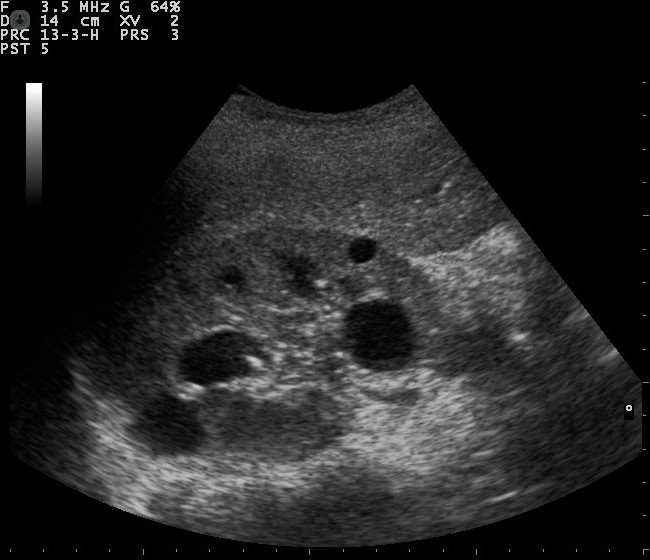All about polycystic kidney disease (PKD)
Written by:Polycystic kidney disease (PKD) is a condition that is thought to affect around 70,000 people in the UK, and can affect men, women and children. But what is polycystic kidney disease? What are its symptoms, and how is it treated? Professor Jeremy Levy, a highly esteemed consultant nephrologist, explains all about this potentially serious renal disorder.

What is polycystic kidney disease?
Adult polycystic kidney disease (APKD) is a common inherited kidney disease in which fluid filled cysts (in reality small holes) slowly enlarge in the kidneys, and can lead to kidney failure. In some people these renal cysts remain small and never lead to problems, but in others they can cause the kidneys to become very large, and ultimately stop working.
About five to ten per cent of people on dialysis have polycystic kidney disease, and about 50 per cent of people with polycystic kidneys will end up needing dialysis or a transplant in their 60s. Cysts can also form in the liver and other organs, and there can be complications, for example with damage to blood vessels in the brain in a few people.
What is the cause of polycystic kidney disease?
Polycystic kidney disease is a genetic disease, and the cause is a defect in one of two genes called PKD1 and PKD2. About 80 per cent of people have a mutation in PKD1 and about ten per cent in PKD2, and in about ten per cent no genetic abnormality is currently detectable. Diagnosis can be made by ultrasound scan (or other imaging techniques e.g. MRI or CT scans) to see the renal cysts, and genetic testing can help.
What are the symptoms of polycystic kidney disease?
Polycystic kidney disease doesn’t usually present with any symptoms until the renal cysts grow larger than about 1cm, meaning that many people with PKD don’t experience any symptoms for years.
When symptoms present, they may include pain in the sides, back or abdomen, the need to urinate frequently, blood in the urine (haematuria), kidney stones, and fatigue, among others.
Very often PKD is detected when a scan of the abdomen is done for some unrelated reason and the typical appearance of the kidneys is seen, and sometimes during tests for high blood pressure (hypertension). Some people know they have a relative with the condition and get a scan done to see if they have the disease, even when they have no symptoms.
If the kidneys continue to deteriorate, one of the most common complications is kidney failure, which could mean the patient has to receive dialysis treatment or get a kidney transplant.
What is the treatment of polycystic kidney disease?
The renal cysts cannot be prevented but there is a lot that can be done to reduce the risk of kidney failure, slow down progression of kidney damage and prevent damage and harm.
Blood pressure control is hugely important and this will almost always require medication, aiming to get the blood pressure levels to less than about 130/70 mmHg. However, a low salt diet and regular exercise will also lower blood pressure. It is important not to smoke, since this makes kidney damage develop faster, and to ensure blood cholesterol is controlled. A high fluid intake (more than 3 litres a day) might stop cysts growing.
Another polycystic kidney disease treatment is a new drug called Tolvaptan, which can be of benefit to some patients, especially if they already have some sign that their kidneys are deteriorating or are at risk of getting worse. Tolvaptan can also help if people are in pain due to enlarged kidneys. Other treatments might be of use if people have cysts in their livers causing problems.
If you are worried you might have polycystic kidney disease because you are experiencing symptoms, or have a family history of PKD, you can schedule a consultation with Professor Levy by visiting his Top Doctors profile.


